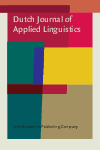
Dutch Journal of Applied Linguistics
Scope & Guideline
Championing Open Access in Linguistic Research
Introduction
Aims and Scopes
- Applied Linguistics Research:
The journal emphasizes empirical research in applied linguistics, exploring language acquisition, language teaching methodologies, and the impact of sociolinguistic factors on language use. - Open Access and Ethical Publishing:
A significant focus on open access publishing practices and the ethical considerations surrounding academic publishing, including discussions on systemic inequality and the moral dimensions of publishing. - Language and Social Issues:
Investigates the relationship between language and social phenomena, such as multilingualism, language choice, and the social capital associated with language use in diverse contexts. - Educational Practices in Language Learning:
Explores effective teaching strategies and instructional methods for language education, including literacy education, second language acquisition, and the role of technology in language learning. - Interdisciplinary Approaches:
Encourages interdisciplinary research that combines linguistics with other fields such as psychology, sociology, and education, providing a holistic understanding of language-related issues.
Trending and Emerging
- Open Science and Open Access Publishing:
There is a marked increase in discussions surrounding open access publishing and the implications for academic equity and accessibility, reflecting a broader movement towards transparency in research. - Ethics in Publishing:
Emerging themes around the ethical considerations in academic publishing practices, including topics like 'openwashing' and 'greenwashing,' signify a growing awareness of the moral responsibilities of researchers and publishers. - Language and Identity:
Research exploring the intersection of language, identity, and social dynamics is gaining traction, indicating a shift towards understanding how language shapes and reflects personal and group identities. - Technology in Language Learning:
A trend towards investigating the role of technology in language education, including the use of digital tools and resources for enhancing language learning experiences, is evident in recent publications. - Intercultural Communication:
Studies focusing on intercultural communication strategies and their implications for language learning and teaching are emerging as significant, driven by globalization and increasing cultural interactions.
Declining or Waning
- Traditional Language Instruction Methods:
There appears to be a waning emphasis on traditional, teacher-centered language instruction methods, as the focus shifts towards more interactive and student-centered approaches. - Basic Linguistic Structure Studies:
Research concentrating on basic linguistic structures, such as grammar and syntax, is becoming less prominent, as more complex and applied linguistic phenomena gain attention. - Accent and Dialect Studies:
While still relevant, studies specifically focused on accent and dialect may be declining in frequency, potentially due to a broader interest in multilingualism and global communication.
Similar Journals
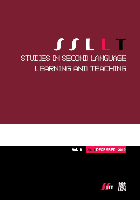
Studies in Second Language Learning and Teaching
Advancing the frontiers of language education.Studies in Second Language Learning and Teaching is a premier open-access journal dedicated to advancing research and scholarship in the fields of education, linguistics, and language acquisition. Published by ADAM MICKIEWICZ UNIVERSITY, KALISZ, this journal has consistently achieved high acclaim, reflected in its impressive Q1 rankings in both Education and Linguistics and Language categories for 2023. With a robust focus on innovative methods, effective pedagogical strategies, and interdisciplinary approaches, Studies in Second Language Learning and Teaching aims to facilitate dialogue among researchers, educators, and practitioners, fostering a deeper understanding of language learning and teaching in diverse contexts. Since its transition to open access in 2011, the journal has expanded its reach, providing valuable resources and research findings to a global audience. With an exceptional Scopus ranking placing it in the top percentiles across multiple categories, this journal stands as a crucial platform for the dissemination of ground-breaking research in second language education.
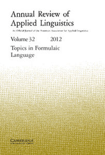
Annual Review of Applied Linguistics
Driving discussions in the dynamic field of linguistics.The Annual Review of Applied Linguistics, published by Cambridge University Press, stands as a premier journal in the realm of linguistics and psychology, with an impressive impact factor identifying its significance: ranking in the Q1 quartile across both fields in 2023. With an ISSN of 0267-1905 and an E-ISSN of 1471-6356, this journal endeavors to provide comprehensive and insightful reviews covering an array of topics within applied linguistics, thus supporting researchers, professionals, and students in advancing their understanding and expertise. Operating from its base in Cambridge, United Kingdom, the journal has maintained a consistent commitment to scholarly excellence since its inception, accelerating discussions on critical issues and emerging research trends from 2005 to 2024. Notably, it holds a prestigious position in Scopus, ranked #26 in Language and Linguistics and #30 in Social Sciences, showcasing its influence and contribution to the scholarship in the field. The Annual Review of Applied Linguistics thus stands as an essential resource for anyone engaged in linguistic research and application.
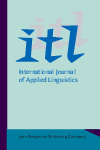
ITL-International Journal of Applied Linguistics
Pioneering insights for educators and linguists alike.ITL-International Journal of Applied Linguistics, published by JOHN BENJAMINS PUBLISHING CO in Belgium, stands as a leading journal in the field of applied linguistics and education, recognized for its rigorous scholarship and impactful contributions. With an impressive ranking of Q1 in both the Education and Linguistics and Language categories, ITL holds its place among the top journals globally, featuring in the Scopus rankings with a notable 91st percentile in both Arts and Humanities as well as Social Sciences. The journal aims to disseminate innovative research exploring the intersection of linguistics, language acquisition, and pedagogical practices, fostering a rich academic dialogue among researchers, educators, and practitioners. Though not currently an open access journal, ITL remains accessible to a broad readership, with an emphasis on high-quality, peer-reviewed articles that inform and inspire advancements in applied linguistics. The journal's commitment to academic excellence and relevance makes it an essential resource for those seeking to understand and contribute to the dynamic landscape of language studies.
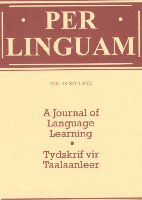
Per Linguam-A Journal of Language Learning
Shaping the Future of Language Education Through ScholarshipPer Linguam - A Journal of Language Learning, published by the University of Stellenbosch's Department Didaktiek, is a distinguished open-access journal that has been a vital resource for language educators and researchers since 1985. With an ISSN of 0259-2312 and an E-ISSN of 2224-0012, it fosters scholarly dialogue surrounding language acquisition and pedagogy. Positioned in the Q4 category in Developmental and Educational Psychology and Education, and Q3 in Linguistics and Language for 2023, this journal addresses crucial aspects of language learning that impact both teaching practices and learner outcomes. Although its Scopus rankings reveal challenges, the journal remains committed to its objectives of advancing knowledge and innovation in language education. Operating from Matieland, South Africa, Per Linguam invites contributions that explore the intersections of theory, research, and practical application, offering a platform for educators, students, and policymakers to share insights and strategies that can transform language learning experiences globally.

Journal of Research in Applied Linguistics
Connecting Researchers and Educators in Language StudiesJournal of Research in Applied Linguistics is an esteemed academic journal published by Shahid Chamran University Ahvaz, Iran, focusing on the dynamic field of linguistics and language studies. With an ISSN of 2345-3303 and an E-ISSN of 2588-3887, the journal has established itself as a valuable resource for researchers and professionals aiming to explore diverse issues related to applied linguistics, including language acquisition, pedagogy, and sociolinguistic interactions. As part of a robust academic community since its inception in 2017, it is recognized with a Q2 quartile ranking in the world of linguistics and achieved impressive Scopus ranks reflective of its growing impact, particularly within the arts and humanities. The journal embraces an open access policy, enhancing its reach and availability to a broad audience. Researchers, educators, and students alike will find in the Journal of Research in Applied Linguistics a critical platform for dialogue, innovation, and contribution to the evolving landscape of language research.

Suvremena Lingvistika
Fostering Innovation in Linguistics and Language Studies.Suvremena Lingvistika is a distinguished open-access journal published by the Croatian Philological Society, dedicated to advancing research in the field of linguistics and language. Since its establishment, the journal has been pivotal in promoting scholarly dialogue within the linguistics community, especially among researchers and academics in Croatia and beyond. With an ISSN of 0586-0296 and an E-ISSN of 1847-117X, the journal has transitioned to an open-access model since 2007, ensuring that research is freely accessible to all. As of 2023, it holds a respectable Q3 ranking in the Linguistics and Language category, reflecting its potential contribution to the field. The journal's scope encompasses a wide array of linguistic disciplines, encouraging both theoretical and empirical studies. Supportive of new research, Suvremena Lingvistika aims to foster innovative approaches and methodologies in linguistics, making it an essential resource for students, researchers, and professionals eager to explore the complexities of language. With its ongoing publication until 2024, it continues to shape the linguistic landscape, providing valuable insights and fostering collaboration among scholars globally.

TESL Canada Journal
Transforming Language Acquisition Through Scholarly ExchangeTESL Canada Journal, published by TESL Canada, serves as a vital resource for researchers, educators, and practitioners in the field of English as a Second Language (ESL) and applied linguistics. With its commitment to advancing scholarship and best practices in language education, this esteemed journal fosters a platform for the dissemination of high-quality research and innovative pedagogical approaches. Although it operates without open access, its comprehensive articles and reviews offer valuable insights into current trends and challenges faced by ESL educators across Canada and internationally. The journal is dedicated to promoting a deeper understanding of language acquisition processes and instructional methodologies, contributing significantly to the professional development of its readership. Located in Burnaby, Canada, the journal aims to bridge the gap between theory and practice, making it an indispensable source for educators and researchers looking to enhance their expertise in ESL education.
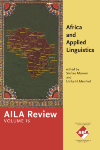
AILA Review
Championing quality research in linguistics and applied studies.AILA Review, published by John Benjamins Publishing Co, stands as a pivotal resource within the field of linguistics and language studies. With an ISSN of 1461-0213 and an E-ISSN of 1570-5595, this journal is dedicated to fostering innovative research and scholarship that advances the understanding of language in its diverse forms and applications. Spanning significant years from 2003 to 2016 and 2018 to 2024, AILA Review has established itself with a commendable reputation, reflected by its Q2 ranking in Linguistics and Language and notable Scopus rankings, positioning it in the 73rd percentile among Arts and Humanities. As an essential forum for researchers, professionals, and students alike, the journal invites high-quality contributions that engage with theoretical and practical aspects of language acquisition, multilingualism, and applied linguistics, enhancing discourse in these vital areas of study. Although not an open-access journal, its commitment to quality ensures that publications are widely recognized and cited, fostering impactful scholarly exchanges.

Unterrichtspraxis-Teaching German
Elevating Language Education Through Rigorous ScholarshipUnterrichtspraxis-Teaching German is a prominent academic journal published by WILEY, dedicated to advancing the field of German language teaching and pedagogy. With its ISSN 0042-062X and E-ISSN 1756-1221, this journal serves as a vital resource for educators, researchers, and students working to improve methodologies and outcomes in the teaching of German. Although it does not currently offer Open Access options, [[the journal remains committed to high-quality scholarly contributions that foster innovative practices and theoretical advancements in language education. Based in Hoboken, NJ, the journal has established a reputation for its rigorous peer-review process and relevance across multilingual education contexts. In a world where language skills are increasingly important, Unterrichtspraxis-Teaching German plays a crucial role in promoting effective teaching strategies and contributing to the broader discourse surrounding language acquisition and pedagogy.
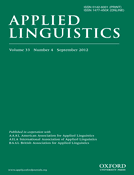
APPLIED LINGUISTICS
Bridging Theory and Practice in Language StudiesApplied Linguistics, published by Oxford University Press, is a premier scholarly journal that has significantly contributed to the fields of linguistics and communication since its inception in 1980. With an impressive impact factor and ranked in the top quartile (Q1) in both Communication and Linguistics and Language categories, Applied Linguistics is recognized for its rigorous peer-reviewed articles that explore the intersections of language, society, and cognition. The journal enjoys a remarkable position in the Scopus rankings, placing it among the top 2% of publications in its discipline. Researchers, professionals, and students benefit from its comprehensive scope, which encompasses innovative research on language acquisition, discourse analysis, and applied linguistics methodologies. Although not an open access journal, its commitment to advancing knowledge and fostering academic discussions makes it an indispensable resource for anyone interested in the critical role of language in various contexts.